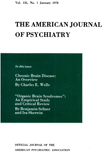METHODS EMPLOYED AND RESULTS OBTAINED IN PSYCHIATRIC STUDIES WITH NEW DRUGS ACTING ON THE BRAIN STEM
Abstract
The method and results of treatment with reserpine, chlorpromazine, and Covatin are reported. Also emphasized are the expediency of a semi-darkened ward and the patient's accessibility to early psychotherapeutic contact. With chronic cases, the knowledge of the spontaneous course of the disease is the foundation of our appraisals of the therapeutic results. Categorization of patients is discussed according to the course of their illnesses before treatment. Results of therapy are further broken down into 6 degrees of improvement. Cases of schizophrenia treated by reserpine are used as an example for the manner in which pharmacological treatment affects only the temporary disease process. Follow-up studies of 194 patients mainly show that the treatment has no long-term effect on the course of the various schizophrenic processes. In every case, the schizophrenic process 1 year after treatment runs the same course as before.
Access content
To read the fulltext, please use one of the options below to sign in or purchase access.- Personal login
- Institutional Login
- Sign in via OpenAthens
- Register for access
-
Please login/register if you wish to pair your device and check access availability.
Not a subscriber?
PsychiatryOnline subscription options offer access to the DSM-5 library, books, journals, CME, and patient resources. This all-in-one virtual library provides psychiatrists and mental health professionals with key resources for diagnosis, treatment, research, and professional development.
Need more help? PsychiatryOnline Customer Service may be reached by emailing [email protected] or by calling 800-368-5777 (in the U.S.) or 703-907-7322 (outside the U.S.).



